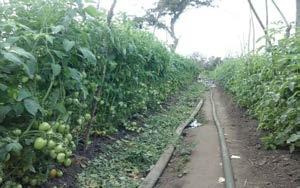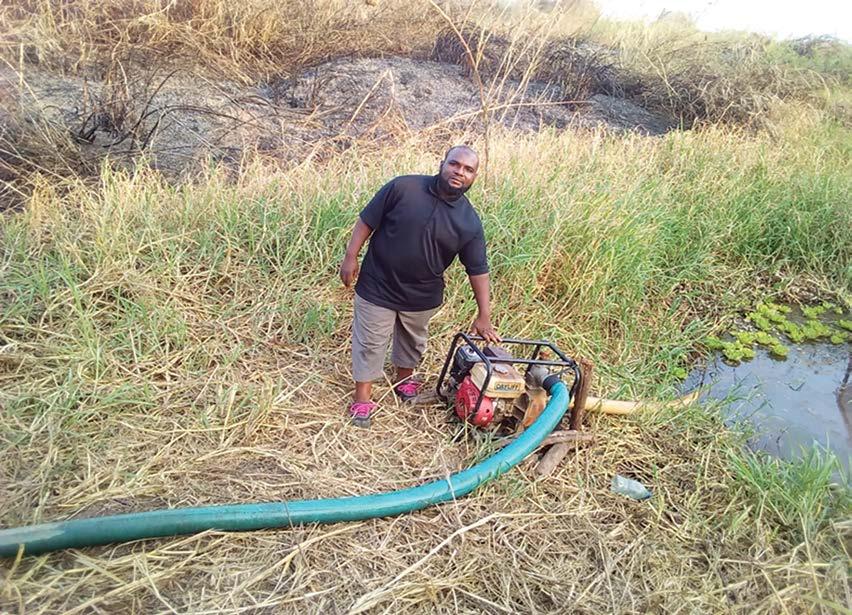
3 minute read
Drip Irrigation for a better livelihood
Matching grant from MEDA helps Tanzanian farmer multiply his harvests and income
Growing vegetables in an area where rains are not predictable can be challenging.
Under these circumstances, irrigation becomes a necessity. But many small-scale farmers cannot afford the cost of equipment that would increase their yields.
With help from MEDA, Shamte Hamis has learned what a difference a proper irrigation system can make.
Hamis lives in the Ikwiriri area of Tanzania’s coastal region.
His vegetable garden is about four kilometers (2.49 miles) from the village of Ikwiriri and close to the Rufiji river outlet. At the river outlet, he places a suction pipe and machine to siphon water and irrigate his vegetable garden.
Assistance from MEDA helped him to purchase a new water pump. Before getting that equipment, he used to harvest around 20-40 crates of tomatoes twice a year. That harvest would provide earnings of between 300,000 to 600,000 Tanzanian shillings ($130 to $260 US).
He had a small pump, but it didn’t have the capacity to supply his whole garden.
A farmer friend told him about a short course on drip irrigation technology offered at Sokoine University of Agriculture in the community of Morogoro, about 350 km (217 miles) to the west. Hamis’ farm is near the Rufigi river, so he opted to put the technology into practice. He began by establishing a small greenhouse where he practiced drip irrigation
using a small water pumping system which had very low horsepower. That system did not allow him to expand his crops, so he depended only on small greenhouse farming.
Hamis is also a member of the ‘Heshimu kazi’ (‘respect your work’ in Swahili) group. One day during their group meetings, he heard from the group chairperson who outlined MEDA’s electronic voucher program that helps small businesses buy equipment. He was keenly interested in a more powerful water pump which cost about 480,000 Tanzanian Shillings ($208 USD.)
MEDA uses vouchers instead of cash for its grant programs to ensure that funds are used for the specified purpose. E-vouchers are used instead of paper to minimize fraud, reduce cost and the time required to complete a transaction.
MEDA provides an alphanumeric text to grant recipients. The recipient shares the text information with a supplier, who verifies it before providing the equipment.
In the five years since MEDA’s program began, 371 farmers have received e-vouchers to buy pumps. In total, the project has provided cost-shared assistance to over 13,000 farmers.
Hamis was among the first to enlist his participation in the MEDA program and prepared himself for a 50% matching contribution, meaning that he would pay
half the cost of the pump. After a few days he received an electronic voucher in a text message to his mobile phone. He redeemed the voucher when a supplier came to Ikwiriri to deliver the equipment to small businesses who had also received vouchers.
The pump allowed him to expand his vegetable garden from one acre to 2.5 acres, as he realized this system was more powerful and efficient than he had even imagined.

Growing more tomatoes via irrigation
After installing the water pump last year and using a drip irrigation system for his crops, he now harvests more than 100 crates of tomatoes and earns more than $649 US from each of his two annual harvests.
He also grows okra and peppers.
“There is a huge difference in my income since I began applying drip irrigation farming powered by a water pump from MEDA’s program; I can now diversify part of my income to another business i.e. a small retail shop (near his home) where people get basic groceries. The income from the shop more than suffices household needs. I am so grateful and appreciative to MEDA and its partners for such programs that assist small scale farmers.” ◆

Shamte Hamis with the pump he purchased with help from MEDA



